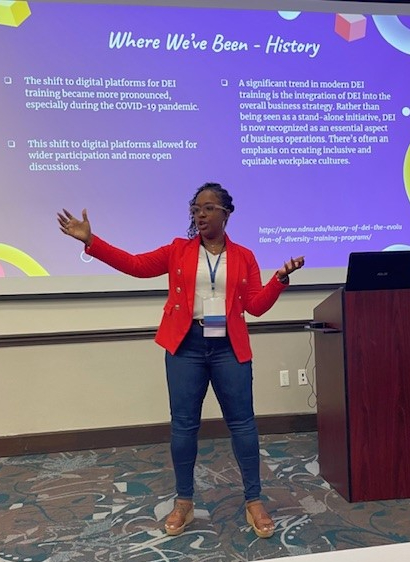One of the biggest opportunities for folks who want to make an impact through entrepreneurship is to tackle things that Corporate America has gotten wrong and so we’ve asked some of the best and brightest in the community to share examples of what Corporate America is getting wrong in their industries.
Kesha Hamilton

Corporate America gets placing the proper value on the impact of race in every part of our existence wrong – as a result corporate America does not invest appropriately or significantly in understanding the impact of race and mitigating and eliminating the negatives that come from the impact of race. Read more>>
Amber Harris

That “experience” is the great differentiator on a resume. It’s not. What separates the good from the great is what is in between the lines. Experience will show you someone that can arrive to a workplace but not if they got there early or stayed late. Experience will show you that they can complete a task but not how much effort they put into it. Experience will show you that they can commit for a period of time but not what kind of attitude they bring with them. It’s about the PERSON behind the resume and the intangibles they possess that will make them your best hire. Read more>>
Rachel Mpala

Corporate America often misses the mark when it comes to truly understanding the unique challenges that women face in the workplace. One of the biggest mistakes is the assumption that gender equality has been achieved simply because we’ve made marginal progress. Yes, we’ve seen more women in leadership roles, but the reality for many working women, regardless of their level, is still fraught with bias, burnout, and a sense of isolation. Read more>>
Melissa Pennington

One of the key missteps Corporate America often makes in the realm of HR is failing to truly recognize and invest in people as their most valuable asset. While many companies talk about “people first” initiatives, in practice, they often prioritize short-term profits over long-term employee well-being and development. This disconnect can manifest in a variety of ways, such as inadequate support for career development, a lack of meaningful engagement with diversity and inclusion initiatives, and an over-reliance on rigid performance metrics that dehumanize employees. Read more>>
Blair Roedel

One thing Corporate America often gets wrong in the construction industry is the lack of efficiency and open communication. In my previous corporate life in union mechanical construction, I saw firsthand how processes were often bogged down by unnecessary bureaucracy, and there was a clear disconnect between the different parties involved. Decisions were frequently made without input from everyone at the table, leading to frustration and inefficiencies on the job site. I believed there was a better way—one where communication could be more transparent, trust more deeply embedded, and where all parties felt like they had an equal say in the process. When people feel heard and valued, projects run smoother, morale is higher, and everyone is more invested in the outcome. Read more>>
John Eisensmith

Food Media and the global food system largely undervalue people and try to “save” them from the “hassle” of cooking instead of simply empowering them to learn the basics to make good food simply. Cooking real, simple, delicious food is easy, quick, and cheap if you take the time to learn the basics of food and cooking. This is why I am on a mission to teach just that, the fundamentals of cooking, so people can see how easy and delicious a simple meal can be when you pay attention to just a few basics. Pick out good produce, cut, sear, combine, and season well, and of course, season to taste and good food becomes easy and quick. Instead of teaching, food companies try to give you the “shortcuts”, “must do’s”, or “best ways” to do things so they can “save” you from your cooking (which in turn devalues each individual’s experience and skills) while portraying home cooking as difficult, expensive, and requiring recipes and lots of ingredients. Read more>>
Arlana Brown

Corporate America often misses the mark in relationship building by focusing primarily on outcomes or transactions rather than cultivating genuine, long-lasting partnerships. Relationships built solely on results—without understanding the vision, culture, or humanity of the other party—become short-lived, transactional, and often unfulfilling. The absence of mutual respect and shared vision erodes trust and prevents meaningful collaboration. One example that comes to mind is the corporate tendency to treat partnerships with community organizations or smaller enterprises as one-sided, driven purely by corporate goals. They might see a community partner only as a means to an end—like checking a box for corporate social responsibility—rather than as collaborators with shared interests. This approach can lead to situations where corporations provide short-term grants or support but don’t invest in the long-term relationship, leaving community organizations feeling used and undervalued. Read more>>
Jie Gao

Corporate America doesn’t focus on my sector – skincare made for people pregnant, TTC or nursing, because generally speaking, it’s considered too niche. Versine started because I had issues finding skincare with effective active ingredients while pregnant, and I realized that there was an underserved demographic in the market. It was a hectic time with a lot of changes, and I couldn’t understand why there were so many baby products but so few products for moms who were undergoing tremendous stress. When I first started conceptualizing the brand, I spoke with some investors and friends in corporate, they all tell me that it’s too small of a total market to sustain a healthy business, especially because people move past this stage in life. Read more>>


